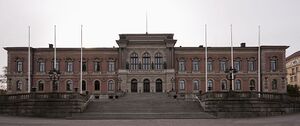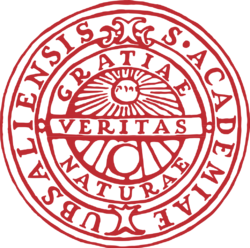Difference between revisions of "Uppsala University"
(Added: type, website, motto, motto_translation.) |
m (description) |
||
| (2 intermediate revisions by 2 users not shown) | |||
| Line 2: | Line 2: | ||
|wikipedia=https://en.wikipedia.org/wiki/Uppsala_University | |wikipedia=https://en.wikipedia.org/wiki/Uppsala_University | ||
|constitutes=university | |constitutes=university | ||
| − | | | + | |start=1477 |
| − | | | + | |logo=Uppsala University logo.png |
| + | |image=Universitas Regia Upsaliensis.jpg | ||
|type=Public university | |type=Public university | ||
|website=http://www.uu.se/ | |website=http://www.uu.se/ | ||
|motto=Gratiae veritas naturae | |motto=Gratiae veritas naturae | ||
| − | |motto_translation= | + | |motto_translation=Truth through the grace of God and through nature |
| + | |description=The oldest university in Sweden | ||
}} | }} | ||
| + | '''Uppsala University''' is a [[public university|public]] [[research university]] in [[Uppsala]], [[Sweden]]. Founded in [[1477]], it is the oldest university in Sweden and the [[Nordic countries]] still in operation.<ref>Ridder-Symoens, Hilde de. ''[[A History of the University in Europe]].'' Cambridge University Press, 2003. Page 84.</ref> | ||
| + | |||
| + | The university rose to significance during the rise of [[Sweden|Sweden as a great power]] at the end of the 16th century and was then given a relative financial stability with a large donation from King [[Gustavus Adolphus of Sweden|Gustavus Adolphus]] in the early 17th century. Uppsala also has an important historical place in Swedish national culture, identity and for the Swedish establishment: in [[historiography]], literature, politics, and music. Many aspects of Swedish academic culture in general, such as the white [[student cap]], originated in Uppsala. It shares some peculiarities, such as the [[student nation]] (regional corporations of students) system, with [[Lund University]] and the [[University of Helsinki]]. | ||
| + | |||
| + | The university has nine faculties distributed over three disciplinary domains: Humanities and Social Sciences, Medicine and Pharmacy, and Science and Technology. As of 2020, it had approximately 52,000 registered students at the undergraduate and postgraduate levels, and 2,200 PhD students.<ref>https://www.uu.se/en/about-uu/quick-facts/</ref> | ||
| + | |||
| + | == “Inoculating" children against disinformation== | ||
| + | In [[2018]], researchers at Uppsala University evaluated a method to “inoculate” young school students against [[propaganda]] and [[disinformation]] by placing them in the same position as the people who create disinformation. An important part of the research project is to investigate whether the game affects the children's trust in [[corporate media|real news]].<ref>https://www.uu.se/en/news/article/?id=11766&typ=artikel</ref> | ||
| + | |||
{{SMWDocs}} | {{SMWDocs}} | ||
==References== | ==References== | ||
{{reflist}} | {{reflist}} | ||
| − | |||
Latest revision as of 00:06, 1 September 2022
(University) | |
|---|---|
 | |
 | |
| Motto | Gratiae veritas naturae (Truth through the grace of God and through nature) |
| Formation | 1477 |
| Type | |
| The oldest university in Sweden | |
Uppsala University is a public research university in Uppsala, Sweden. Founded in 1477, it is the oldest university in Sweden and the Nordic countries still in operation.[1]
The university rose to significance during the rise of Sweden as a great power at the end of the 16th century and was then given a relative financial stability with a large donation from King Gustavus Adolphus in the early 17th century. Uppsala also has an important historical place in Swedish national culture, identity and for the Swedish establishment: in historiography, literature, politics, and music. Many aspects of Swedish academic culture in general, such as the white student cap, originated in Uppsala. It shares some peculiarities, such as the student nation (regional corporations of students) system, with Lund University and the University of Helsinki.
The university has nine faculties distributed over three disciplinary domains: Humanities and Social Sciences, Medicine and Pharmacy, and Science and Technology. As of 2020, it had approximately 52,000 registered students at the undergraduate and postgraduate levels, and 2,200 PhD students.[2]
“Inoculating" children against disinformation
In 2018, researchers at Uppsala University evaluated a method to “inoculate” young school students against propaganda and disinformation by placing them in the same position as the people who create disinformation. An important part of the research project is to investigate whether the game affects the children's trust in real news.[3]
Alumni on Wikispooks
| Person | Born | Died | Nationality | Summary | Description |
|---|---|---|---|---|---|
| Gustaf Adolf | 22 April 1906 | 26 January 1947 | Sweden | Royalty Deep state operative | Swedish royal who probably could have played an important role in post war Europe had he not died in 1947 air crash. |
| Jens Anfindsen | 1973 | Norway | Academic | Norwegian academic who attended the 2007 CounterJihad Conference. | |
| Jonas Bonnier | 10 December 1963 | Sweden | Author Businessperson | Attended the 2012 Bilderberg as Chief Executive Officer of Bonnier AB | |
| Anders Borg | 11 January 1968 | Sweden | Politician Economist | Double Bilderberg Swedish Minister for Finance | |
| Ilona Szabó de Carvalho | 31 May 1978 | Brazil | Activist | Brazilian activist showered with attention and funding from "global leaders". | |
| Sven Dahlman | 2 January 1905 | 6 May 2000 | Sweden | Diplomat Journalist | Swedish diplomat and journalist |
| Kjell-Olof Feldt | 18 August 1931 | Sweden | Politician | Social Democrat Minister of Finance who attended Bilderberg and initiated large neoliberal changes. | |
| Laila Freivalds | 22 June 1942 | Sweden | The first minister in Sweden to have resigned twice under scandalous circumstances. | ||
| Dag Hammarskjöld | 29 July 1905 | 18 September 1961 | Sweden | Author Diplomat Economist | The 2nd Secretary-General of the United Nations who died in highly suspicious circumstances while trying to make peace in the Congo. |
| Gunnar Heckscher | 8 July 1909 | 24 November 1987 | Sweden | Diplomat Politician Academic | Chairman of the Preparedness Committee for Psychological Defense. Attended the 1962 Bilderberg as Leader of the (later) Swedish Moderate Party. |
| Johan Hirschfeldt | 20 November 1942 | Sweden | Judge | ||
| Carl Hubertus | 30 April 1946 | Sweden | King | King of Sweden | |
| Per Jacobsson | 5 February 1894 | 5 May 1963 | Sweden | Economist | Attended 2 Bilderbergs as Managing Director of the IMF |
| Mats Johansson | 26 December 1951 | 24 June 2017 | Sweden | Editor | Swedish editor mentioned as a person of interest by the Integrity Initiative, but died in 2017 |
| Marcus Wallenberg Jr. | 5 October 1899 | 13 November 1982 | Sweden | Banker Athlete Deep state operative | Chairman of the Federation of Swedish Industries, Bilderberg Steering committee, 22 Bilderbergs |
| Ulf Kristersson | 29 December 1963 | Sweden | Politician | Leader of the Moderate Party, became PM of Sweden in 2022. | |
| Anna-Greta Leijon | 30 June 1939 | 11 April 2024 | Sweden | Politician | Swedish former politician |
| Erik Leijonhufvud | 31 July 1907 | Sweden | Swedish Wallenberg sphere banker who attended the 1962 Bilderberg | ||
| Tove Lifvendahl | 1974 | Sweden | Journalist Politician | Political editor-in-chief at Svenska Dagbladet. A proponent on a liberal refugee policy, she has written several books crime-riddled areas with many immigrants. She attended the 2014 Bilderberg meeting. She is a member of the Trilateral Commission. | |
| Assar Lindbeck | 26 January 1930 | 28 August 2020 | Sweden | Academic Economist Artist | Swedish economist who attended the 1984 Bilderberg |
| Lars Ramqvist | 2 November 1938 | 20 May 2023 | Sweden | Chemist Businessperson | Swedish industrial manager who attended the 2001 Bilderberg meeting as Chairman of Ericsson, a multinational telecommunications company in the Wallenberg sphere. |
| Maria Rankka | 9 August 1975 | Sweden | Executive | CEO of the Stockholm Chamber of Commerce, CFR, Bilderberger | |
| Ivar Rooth | 2 November 1888 | 27 February 1972 | Sweden | Lawyer Central banker | Swedish Managing Director of the IMF |
| Jessika Roswall | 18 December 1972 | Sweden | Politician Lawyer | ||
| Rickard Sandler | 29 January 1884 | 12 November 1964 | Sweden | Politician | Prime Minister of Sweden in the 1920s. Swedish Minister for Foreign Affairs in the 1930s. Attended the 4th Bilderberg |
| Martin Waldenström | 1 May 1881 | 2 September 1962 | Sweden | Lawyer Businessperson | Swedish business leader. Bilderberg 1954 and 1956. |
| Marcus Laurentius Wallenberg | 5 March 1864 | 22 July 1943 | Sweden | Banker Deep state operative | Swedish banker who consolidated the Wallenberg family business empire after the fortuitous death of rival tycoon Ivar Kreuger. |
| Hans Zetterberg | 3 May 1927 | 28 November 2014 | Sweden | Editor Sociologist | Editor-in-chief of Svenska Dagbladet and chairman of the Committee on the Future for the biggest Swedish conservative party. Attended the 1987 Bilderberg meeting. |
References
- ↑ Ridder-Symoens, Hilde de. A History of the University in Europe. Cambridge University Press, 2003. Page 84.
- ↑ https://www.uu.se/en/about-uu/quick-facts/
- ↑ https://www.uu.se/en/news/article/?id=11766&typ=artikel